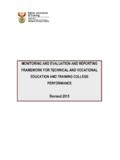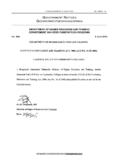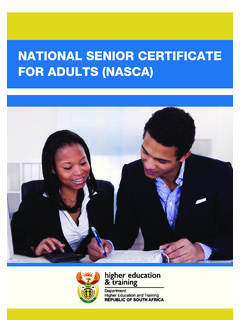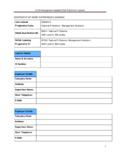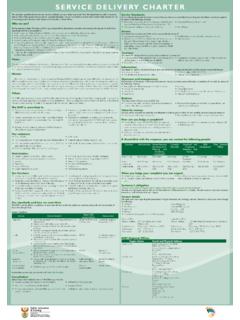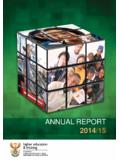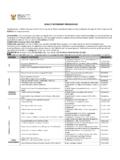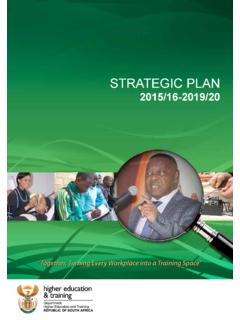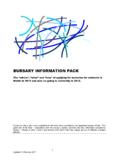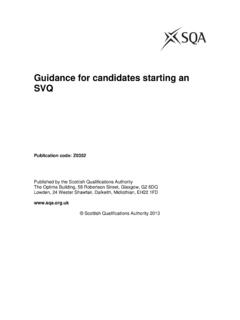Transcription of NATIONAL CERTIFICATES (VOCATIONAL) SUBJECT …
1 NATIONAL CERTIFICATES ( vocational ) SUBJECT guidelines LIFE SKILLS AND COMPUTER PRACTICE NQF LEVEL 2 IMPLEMENTATION: JANUARY 2020 Life Skills and Computer Practice SUBJECT guidelines Level 2 (January 2020) NATIONAL CERTIFICATES ( vocational ) 2 Department of Higher Education and Training INTRODUCTION A. What is the SUBJECT Life Skills and Computer Practice about? The NATIONAL CERTIFICATES ( vocational ) is qualifications at NQF Level 2 - 4 offered in Further Education and Training Colleges. The Fundamental component of the NATIONAL CERTIFICATES ( vocational ) is integral to all vocationally orientated qualifications that allow the student to progress into further learning along a vocational pathway in various fields.
2 Life Skills and Computer Practice is one of three fundamental subjects that enhances students possibilities to achieve success in their vocational studies as well as in life. This SUBJECT consists of a combination of life skills and information and communication technology (ICT) that covers essential topics such as personal and career development, health and well-being, citizenship, and learning skills, as well as basic computer applications. The content matter used for application in the ICT component of the SUBJECT must be based on the content matter of the first four topics of the life skills component.
3 Assessments should not use unrelated texts and content outside of this curriculum. For example, when creating and editing a word document, the content matter of the text could be the key habits of a healthy lifestyle. B. What are the Aims of the SUBJECT Life Skills and Computer Practice? This SUBJECT aims to equip students with skills, values and knowledge necessary to adapt, survive and succeed in a constantly changing world. Whilst the vocational training is grounded in the South African context, it also incorporates global imperatives.
4 Life Skills and Computer Practice aims to equip students in a holistic way with the personal, psychological, cognitive, physical, moral, social and cultural skills to live meaningful and successful lives. The SUBJECT aims to enable students to respond positively to the challenges of a constantly changing world, to make informed and responsible decisions, realise their potential and make a meaningful contribution to our South African society and economy, as they become vocationally qualified. Life Skills and Computer Practice in the NATIONAL certificate ( vocational ) is underpinned by the following principles: an outcomes-based approach to education; high knowledge and skills emphasis; integrated and applied competence; progression, articulation and portability; social transformation, human rights, promotion of Indigenous Knowledge, inclusivity, environmental considerations, physical wellness and social justice; and credibility, quality, relevance and responsiveness.
5 C. Why is Life Skills and Computer Practice important as a Fundamental SUBJECT ? The core motivation for the provision of Life Skills and Computer Practice is the holistic development of individuals with the required skills, knowledge and values and the necessary cognitive processes. This is to enable the application of these skills in both the workplace and in life, in a considerate, reflective, informed and thoughtful manner. Life Skills and Computer Practice SUBJECT guidelines Level 2 (January 2020) NATIONAL CERTIFICATES ( vocational ) 3 Department of Higher Education and Training D.
6 What is the link between Life Skills and Computer Practice Learning Outcomes and the Critical and Developmental Outcomes? The student is able to organise and manage him or herself using strategies to deal with personal issues and develop a plan to achieve his or her goals. The student is able to demonstrate initiative in identifying and using opportunities and taking responsibility for self-development within a dynamic environment. The student is able to demonstrate an understanding of the world as a set of related systems by recognising habit-forming drugs and their impact on self and society.
7 The student is able to communicate effectively in presenting relevant information by investigating different types of work environments and discussing available training opportunities. The student is able to identify and solve problems when encountering obstacles to personal development. The student is able to use science and technology effectively when using the computer. The student is able to work effectively with others as a member of a team discussing matters relating to Life Skills and Computer Practice. The student is able to participate as a responsible citizen in the life of the local, NATIONAL and global communities by identifying and learning about values and norms of behaviour and how this impacts on the above.
8 The student is able to collect, organise and evaluate information by investigating relevant needs and issues in the community. E. Which factors contribute to achieving the Life Skills and Computer Practice Learning Outcomes? Enabling environment It is important that Life Skills and Computer Practice is presented within a context of honest enquiry and respect. Resources The student must have access to all the necessary resources required. Exposure to particular experiences The student must be exposed to real community and social issues that will create a real context within which their projects can unfold.
9 Suitable qualified lecturers The Life Skills and Computer Practice lecturer must have a basic knowledge of psychology and of life skills, and study programmes in TVET Colleges and be well informed about health and well-being, HIV and AIDS, human rights, career education and the latest developments in various career fields, community issues, accessing community structures and should possess basic research and networking skills. The ICT lecturer must be computer literate and have an advanced knowledge of the following programmes: Word processing, Spreadsheets, Presentation and knowledge of the Internet and email.
10 The life skills and ICT components could be taught by the same lecturer where possible, or by two different lecturers, depending on the qualifications of the lecturers. Creativity The lecturer should apply creativity to ensure that Life Skills and Computer Practice is offered in an innovative, interactive and exciting way, to enable students full participation and enjoyment of this SUBJECT . Life Skills and Computer Practice SUBJECT guidelines Level 2 (January 2020) NATIONAL CERTIFICATES ( vocational ) 4 Department of Higher Education and Training LIFE SKILLS AND COMPUTER PRACTICE LEVEL 2 CONTENTS 1.
